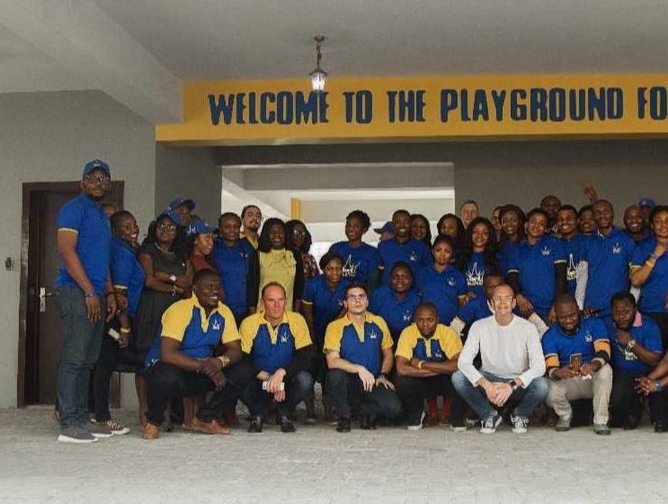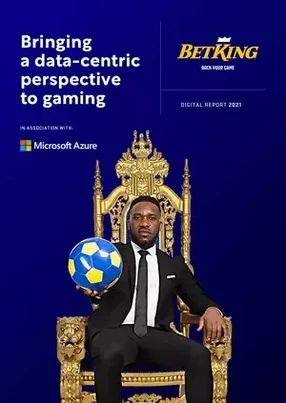Officially entering the African gaming market in 2018, BetKing is a company where entertainment and the latest digital technology have been fused with a highly customer-centric, data driven approach to produce an exceptional platform with its sights set firmly on the future. Now with operational bases in Nigeria, Kenya, and Ethiopia, BetKing offers its services on a variety of sports, both real and virtual, and continues to explore innovative new methods for achieving one of its primary objectives: bringing fans closer to the sports and games they love.
To find out how one aspect of its digital journey, data, is helping to push the company into exciting new territory, we spoke with Ian Thomas, VP of Data and Analytics.
A graduate of both Oxford and Cambridge Universities, Thomas’s formidable career includes 20 years’ experience working in data and analytics at some of the world’s largest tech companies. He joined BetKing in mid-2020 on the promise of a fresh challenge. “The company attracted me because it provides the opportunity to build a data and analytics function from scratch. BetKing is a very rapidly growing company with a real thirst for data,” he explains. As a seasoned veteran of the industry, Thomas’s experience, particularly as a ‘DataIQ 100 2020’ listed data and analytics leader, has proven invaluable as BetKing prepares for its next phase of development. In particular, his aversion to “overburdening people with process” and planning for future scalability have been crucial to the company’s transformation strategy.
DataIQ 100 - tracking data’s most influential people
Thomas calls his inclusion on the 2020 edition of the DataIQ 100 list “a great honour.”
While acknowledging the value he’s been able to create for businesses, Thomas still cites the positive impact he’s made in the lives of individuals, from customers to team members to stakeholders, as his proudest career achievement.
The biggest challenge in terms of digital transformation, he posits, is not necessarily the acquisition of technology so much as the cultural investment that gives it a foundation.
When Thomas talks about scalability he isn’t just referring to data volume, but rather thinking in more holistic terms: if a process relies on manual elements, how can it be automated? How can teams be built to optimise their capabilities? “Those kinds of issues are really important, as well as conscientiously thinking about our responsibility and place in society. BetKing is very mindful and respectful of the role that it plays in the markets and communities we operate in,” he adds. This places data management far beyond simply being a technological concern and elevates it to being a core enabler of cultural best-practice. In keeping with this, the company is shifting from passive to proactive data management, which has resulted from an increased emphasis on compliance and legislative requirements, as well as the company’s growth.
Thomas’s vision for data management at BetKing is to create a “common foundation for helping people to access and share data and insights.” This requires a flexible approach that many older and/or larger companies in the gaming industry could not achieve easily because of their legacy technology, processes and organizational structures. BetKing, an agile, digital native organisation, is unencumbered by similar restrictions. “Larger organisations can struggle with fragmentation in their data, with siloed teams often competing for who can provide the definitive view of business performance,” he says. “Instead of that, they need to build a common data foundation that democratises access to data while providing a level playing field for insights.” BetKing has taken stock of gaming’s transformation over the last two decades and opted not to follow the “preconceived notions” of how it operates. This impulse to break new ground is indicated by the company’s decision to target Africa, a historically under-served market. “The African territories in which we operate have some very significant differences to the UK and Europe in terms of player behaviour. There aren't many established businesses that understand that.”
BetKing’s entrepreneurial spirit and collaboration with a strong network of registered agents combined with its large online user base makes for a unique customer landscape. Thomas states that this customer profile has been partially generated by using Google Analytics, an important component of BetKing’s digital transformation. “Our roadmap consists of continuing to build a horizontally scalable platform, both from a technology and from a data perspective. We really need to start expanding that concept to create a more heterogeneous data management environment.” Referring to an automated system that integrates disparate databases into a unified interface, ‘heterogeneous’ databases will be important as BetKing seeks to optimise its user experience (UX). “Data from the front-end of our application stack should be treated no differently from the data we get from our backend BI (business intelligence) environment. We want to be able to expose that information at high volume to our growing data science team and build a range of value-added models against it.” The resulting opportunities could include recommenders, predictive monetization features, and enhanced fraud detection/problematic player recognition capabilities.
These new features will also fit into BetKing’s broader development plans, not least of which is a significant market expansion to new territories and product areas. Although exact details are currently being kept under wraps, Thomas indicates that entertainment broadcaster MultiChoice Group, one of Africa’s most prominent companies in the sector, will play a key role. “[MultiChoice has] broadcast rights for premiership and other top-league football in Africa,” an important asset for a continent whose primary consumer betting interest is focused on that sport. “BetKing’s goal is to deliver an integrated entertainment experience straddling the consumption of sports content and live games and placing bets on them,” he adds. “A lot of our product investment and expansion over the next 12 to 24 months will be focused on that area.”
BetKing’s growing maturity in leveraging data across all levels of the company affords one of its biggest opportunities for growth. Thomas reasons that unlocking this information will improve decision-making, help BetKing understand its customers better, price its products appropriately and create a better experience overall. “Operating in Africa creates some unique challenges,” he says, “a lot of which has to do with the rapidly changing state of internet access. Bandwidth is still a major challenge for many of our players, so we have to offer low bandwidth versions of our products to drive engagement.” BetKing’s ability to meet customers’ needs was put to the test at the onset of the COVID-19 pandemic, which saw the cancellation of major sporting events and put a strain on its business model. Undeterred, the company quickly launched a range of virtual sports betting products, thus resolving the issue and diversifying its product portfolio simultaneously. “Since professional football has come back, our business has not just bounced back to where it was before COVID, it's grown significantly.”
One of BetKing’s key partners for a long time has been Microsoft. Not simply the supplier of BetKing’s tech infrastructure, the software giant has provided guidance and support for important stages of its digital transformation, such as migrating to the cloud. Thomas explains:
“My team and I have been moving fast as we can towards more of a platform as a service (PaaS) approach to infrastructure. We're making use of things like Azure Synapse, Azure Databricks, and Azure Data Factory to create that kind of modern approach.
“More recently, we’ve been implementing a data lake so that we can start housing unstructured data on a large scale. Microsoft has been very supportive in providing advice and architectural consulting to help us make smart choices and build that infrastructure out in a scalable way.”
In many ways, BetKing’s steady and assured COVID-19 response is emblematic of its business overall: it is secure in its market, its brand is popular with its customers, and knows the metrics by which it will measure future success. For Thomas, this ongoing journey of refinement will be dependent on a highly data-centric philosophy, which will not only solve the problems of today but anticipate the innovations of tomorrow. “BetKing is building self-serve dashboards and reports to place insights directly into peoples’ hands on a daily, weekly or monthly basis. People need to understand how the questions they have can be answered with the data that's available, and the more we can do to help them become self-sufficient the more that data-driven decision-making will take hold across the organisation.” This democratised approach – with a central team providing the data, tools and expertise to enable the day-to-day use of data to support decision-making across the business – is at the heart of Thomas’s plans to build out his team and the company’s data platform in 2021. “Trying to evolve those two things simultaneously is at the heart of the challenge we’re tackling right now. That opportunity is really exciting because we can act fast, the demand is there, and our CEO [Byron Petzer] is leading the commitment.”




